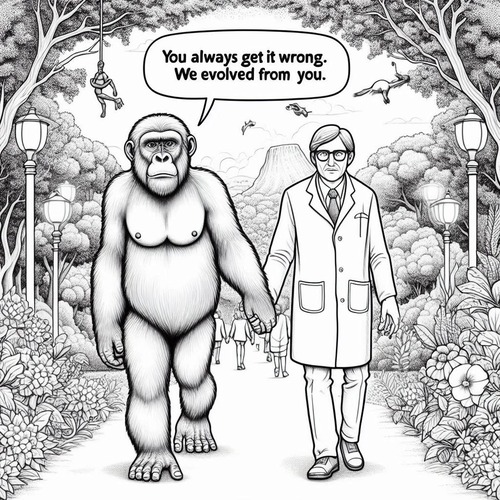Defending Creationism: Responses to Evolutionists
Doubting Darwin, Trusting the Creator
Defending Creationism: In the ongoing dialogue between proponents of evolution and creation science, challenges are often raised by both sides. Evolutionists frequently assert the overwhelming evidence for evolution and question the scientific validity of creationism. However, creationists offer robust rebuttals grounded in science, theology, and critical analysis. In this comprehensive web post, let’s delve into ten common challenges posed by evolutionists and present compelling creationist responses that, we reckon, should withstand scrutiny, and are adequate in defending creationism.
Challenge: Evolution has overwhelming evidence, while creationism relies solely on faith.
The Rebuttal While evolution indeed presents a wealth of scientific evidence, creationism is not devoid of empirical support. Creationists engage with scientific data, offering alternative interpretations that align with their worldview. Moreover, faith in creationism isn’t blind but is informed by various lines of evidence, including cosmological, geological, and biological arguments. Creationists argue both evolutionists and creationists interpret the same evidence through different philosophical lenses, highlighting the philosophical underpinnings inherent in scientific interpretation.
Furthermore, creationists contend evolutionists are not immune to biases either. They argue evolutionists do smuggle their own presuppositions and worldviews into their interpretations of scientific data. This includes a naturalistic and materialistic framework that often excludes supernatural explanations a priori. Institutional bias can further challenge creation scientists, as mainstream scientific institutions and publications may exhibit preferential treatment towards evolutionary perspectives, marginalizing alternative viewpoints.
Challenge: The fossil record provides clear evidence for evolution but lacks evidence for a sudden creation event.
Defending Creationism: The Rebuttal The fossil record does not unequivocally support a purely evolutionary narrative. Far from it. While it does reveal patterns of change over time, it also contains gaps and enigmatic phenomena like the Cambrian Explosion, which challenges gradualistic interpretations of evolution. Creationists argue the sudden appearance of complex life forms aligns with the concept of a Creator bringing life into existence. Moreover, the lack of transitional forms and the presence of many “living fossils” suggest species have remained stable over time, supporting the idea of created kinds, rather than ongoing change.
Challenge: Evolution explains the complexity of life without the need for a creator.
The Rebuttal: Evolutionary explanations for complexity often fall short in addressing the origin of information-rich biological systems. Creationists argue irreducible complexity, observed in various biological structures, presents a significant challenge to purely naturalistic explanations. The intricate complexity of molecular machines and biological systems, such as the bacterial flagellum or the blood-clotting cascade, points to the presence of design rather than undirected processes. Creationists posit the existence of specified complexity in living organisms provides compelling evidence for an intelligent Creator.
Challenge: Geological evidence, such as radiometric dating and stratigraphy, indicates an Earth much older than the biblical timeline suggests. How do creationists reconcile this apparent contradiction?
Defending Creationism: The Rebuttal Creationists offer alternative interpretations of geological data that are consistent with a young Earth paradigm. They argue radiometric dating methods rely on unverifiable assumptions and can produce unreliable results, particularly when applied to rocks of an unknown age. Additionally, creationists propose mechanisms such as accelerated nuclear decay or variations in decay rates over time, which could account for the discrepancy between radiometric dates and biblical chronology. Stratigraphic evidence is likewise interpreted within a biblical framework, considering catastrophic events such as the global Flood as significant contributors to the geological record.
Challenge: Irreducible complexity, often cited by creationists, has been debunked as a valid argument against evolution.
The Rebuttal: Irreducible complexity remains a potent challenge to evolutionary theory despite attempts to refute it. The concept, pioneered by biologist Michael Behe, asserts certain biological systems require all their components to be present and functioning for the system to perform its function. Evolutionary explanations invoking gradual, stepwise processes often fail to adequately account for the origin and development of irreducibly complex systems. Creationists argue that irreducible complexity points to intelligent design, emphasizing the need for a transcendent Creator to explain the origin of such intricately designed structures. FOR DETAILS DO VISIT OUR POST: Irreducible Complexity: A Compelling Case for God
Challenge: Evolutionary psychology explains human behaviour and cognition without the need for a soul or divine intervention.
Defending Creationism: The Rebuttal While evolutionary psychology offers insights into human behaviour from a naturalistic perspective, it doesn’t negate the existence of the soul or divine intervention. Creationists assert human cognition and behaviour reflect the imago Dei—the belief that humans are created in the image of God, imbued with spiritual and moral capacities. While evolutionary explanations may shed light on the adaptive functions of certain behaviours, they do not address the deeper existential questions concerning the nature of consciousness, morality, and purpose that lie beyond the purview of science.
Challenge: The presence of vestigial structures in living organisms suggests a history of evolutionary change rather than a perfect creation. How do creationists account for these features within their worldview?
The Rebuttal: Creationists challenge the notion of vestigial structures as evidence for evolution, arguing that many structures once considered vestigial, such as the human appendix, have been found to have functional roles. They assert that structures with reduced or altered functions can be attributed to degeneration following the Fall rather than evolutionary remnants. Additionally, creationists emphasize the concept of baraminology, which posits that organisms were created with a range of genetic potential, allowing for variation within created kinds while maintaining functional integrity.
Challenge: The discovery of exoplanets and the vastness of the universe challenge the notion of Earth’s centrality and uniqueness in the cosmos as depicted in the biblical narrative. How do creationists interpret these findings in light of their beliefs about Earth’s special status?
Defending Creationism: The Rebuttal While the vastness of the universe may challenge human-centric views of cosmology, it does not necessarily undermine the uniqueness of Earth within a biblical framework. Creationists interpret Earth’s special status in terms of its role as the focal point of God’s creative activity and the site of God’s redemptive plan. The existence of exoplanets and the vastness of the cosmos can be seen as manifestations of God’s creative power, highlighting the diversity and grandeur of His creation while underscoring Earth’s significance as the habitat for human life.
Challenge: The genetic similarities between humans and other animals suggest a common evolutionary ancestry.
The Rebuttal: Genetic similarities between humans and other organisms are compatible with a common Designer rather than common ancestry through evolution. Creationists argue that shared genetic features reflect a common blueprint employed by the Creator across different forms of life. Moreover, differences in genetic regulation and organization among species point to distinct patterns of design rather than evolutionary descent. The presence of homologous structures and genetic sequences can be understood within a framework of common design rather than common descent.
Challenge: The scientific consensus overwhelmingly supports evolution, while creationism lacks peer-reviewed evidence.
Defending Creationism: The Rebuttal While evolution enjoys widespread acceptance within the scientific community, it is essential to recognize that scientific consensus is not infallible and has been challenged throughout history. Creationists argue that personal and institutional bias and philosophical presuppositions may influence the interpretation and acceptance of scientific evidence. Furthermore, creationist research and scholarship exist within peer-reviewed literature, albeit in a minority position. Creationists advocate for academic freedom and rigorous scientific inquiry, urging scholars to critically evaluate evidence from both evolutionary and creationist perspectives.
Conclusion: In conclusion, creationists offer robust responses to challenges posed by evolutionists, drawing upon scientific, theological, and philosophical arguments. By engaging with evidence and reasoning from a creationist perspective, individuals can critically evaluate competing worldviews and arrive at informed conclusions regarding the origins of life and the universe. The ongoing dialogue between evolutionists and creationists will, we hope, enrich scientific discourse and foster an environment of open inquiry and diverse perspectives.
Related Reads:
Editor's Pick

Christian Obedience: God’s Empowerment or an Act of Our Will?
Every Christian knows the struggle. You’re fighting a besetting sin—again. You’ve resolved to do better—again. And you’re wondering: Should I [...]

The Throne-Room Vision: Who Did Isaiah See?
The scene is unforgettable: Isaiah stands in the temple, and suddenly the veil between heaven and earth tears open. He [...]

The Angel of the Lord: Can We Be Certain It Was Christ All Along?
Throughout the Old Testament, a mysterious figure appears: the Angel of the LORD. He speaks as God, bears God’s name, [...]
SUPPORT US:
Feel the Holy Spirit's gentle nudge to partner with us?
Donate Online:
Account Name: TRUTHS TO DIE FOR FOUNDATION
Account Number: 10243565459
Bank IFSC: IDFB0043391
Bank Name: IDFC FIRST BANK






